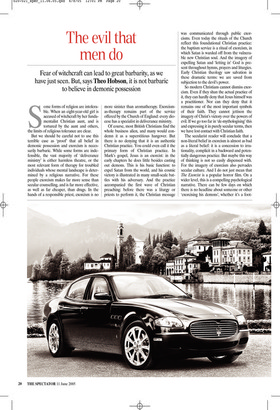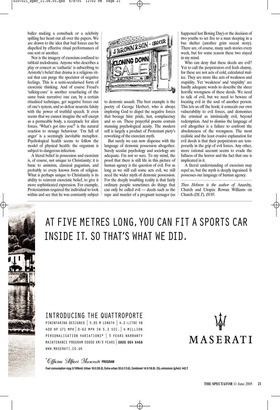The evil that men do
Fear of witchcraft can lead to great barbarity, as we have just seen. But, says Theo Hobson, it is not barbaric to believe in demonic possession Some forms of religion are intolerable. When an eight-year-old girl is accused of witchcraft by her fundamentalist Christian aunt, and is tortured by the aunt and others, the limits of religious tolerance are clear.
But we should be careful not to use this terrible case as ‘proof’ that all belief in demonic possession and exorcism is necessarily barbaric. While some forms are indefensible, the vast majority of ‘deliverance ministry’ is either harmless theatre, or the most relevant form of therapy for troubled individuals whose mental landscape is determined by a religious narrative. For these people exorcism makes far more sense than secular counselling, and is far more effective, as well as far cheaper, than drugs. In the hands of a responsible priest, exorcism is no more sinister than aromatherapy. Exorcismas-therapy remains part of the service offered by the Church of England: every diocese has a specialist in deliverance ministry.
Of course, most British Christians find the whole business alien, and many would condemn it as a superstitious hangover. But there is no denying that it is an authentic Christian practice. You could even call it the primary form of Christian practice. In Mark’s gospel, Jesus is an exorcist: in the early chapters he does little besides casting out demons. This is his basic function: to expel Satan from the world, and his cosmic victory is illustrated in many small-scale battles with his adversary. And the practice accompanied the first wave of Christian preaching: before there was a liturgy or priests to perform it, the Christian message was communicated through public exorcisms. Even today the rituals of the Church reflect this foundational Christian practice: the baptism service is a ritual of exorcism, in which Satan is warded off from the vulnerable new Christian soul. And the imagery of expelling Satan and ‘letting in’ God is present throughout hymns, prayers and liturgies. Early Christian theology saw salvation in these dramatic terms: we are saved from subjection to the devil’s power.
So modern Christians cannot dismiss exorcism. Even if they shun the actual practice of it, they can hardly deny that Jesus himself was a practitioner. Nor can they deny that it remains one of the most important symbols of their faith. They cannot jettison the imagery of Christ’s victory over the powers of evil. If we go too far in ‘de-mythologising’ this and expressing it in purely secular terms, then we have lost contact with Christian faith.
The secularist reader will conclude that a non-literal belief in exorcism is almost as bad as a literal belief: it is a concession to irrationality, complicit in a backward and potentially dangerous practice. But maybe this way of thinking is not so easily dispensed with. For the imagery of exorcism also pervades secular culture. And I do not just mean that The Exorcist is a popular horror film. On a wider level, this is a compelling psychological narrative. There can be few days on which there is no headline about someone or other ‘exorcising his demons’, whether it’s a foot baller making a comeback or a celebrity spilling her heart out all over the papers. We are drawn to the idea that bad forces can be dispelled by effective ritual performances of one sort or another.
Nor is the imagery of exorcism confined to tabloid melodrama. Anyone who describes a play or concert as ‘cathartic’ is subscribing to Aristotle’s belief that drama is a religious ritual that can purge the spectator of negative feelings. This is a semi-secularised form of exorcistic thinking. And of course Freud’s ‘talking-cure’ is another resurfacing of the same basic narrative: one can, by a certain ritualised technique, get negative forces out of one’s system, and so defeat neurotic falsity with the power of truthful speech. It even seems that we cannot imagine the self except as a permeable body, a receptacle for alien forces. ‘What’s got into you?’ is the natural reaction to strange behaviour. ‘I’m full of anger’ is a seemingly inevitable metaphor. Psychological health seems to follow the model of physical health: the organism is subject to dangerous infection.
A literal belief in possession and exorcism is, of course, not unique to Christianity; it is basic to animism, classical paganism, and probably to every known form of religion. What is perhaps unique to Christianity is its ability to reinvent exorcistic belief, to give it more sophisticated expression. For example, Protestantism required the individual to look within and see that he was constantly subject to demonic assault. The best example is the poetry of George Herbert, who is always imploring God to dispel the negative forces that besiege him: pride, lust, complacency and so on. These prayerful poems contain stunning psychological acuity. The modern self is largely a product of Protestant piety’s reworking of the exorcism myth.
But surely we can now dispense with the language of demonic possession altogether. Surely secular psychology and sociology are adequate. I’m not so sure. To my mind, the proof that there is still life in this picture of human agency is the question of evil. For as long as we still call some acts evil, we still need the wider myth of demonic possession. For the deeply troubling reality is that fairly ordinary people sometimes do things that can only be called evil — deeds such as the rape and murder of a pregnant teenager (as happened last Boxing Day) or the decision of two youths to set fire to a man sleeping in a bus shelter (another grim recent story). There are, of course, many such stories every week, but for some reason these two stayed in my mind.
Who can deny that these deeds are evil? Yet to call the perpetrators evil feels clumsy, for these are not acts of cold, calculated malice. They are more like acts of weakness and stupidity. Yet ‘weakness’ and ‘stupidity’ are hardly adequate words to describe the sheer horrific wrongness of these deeds. We need to talk of evil, but we need to beware of locating evil in the soul of another person. This lets us off the hook; it conceals our own vulnerability to evil forces, and demonises the criminal as intrinsically evil, beyond redemption. And to dismiss the language of evil altogether is a failure to confront the absoluteness of the wrongness. The most realistic and the least evasive explanation for evil deeds is that their perpetrators are temporarily in the grip of evil forces. Any other, more rational account seems to evade the fullness of the horror and the fact that one is implicated in it.
A literal understanding of exorcism may repel us, but the myth is deeply ingrained. It possesses our language of human agency.



















































 Previous page
Previous page